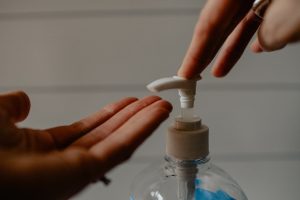Aiming to reduce the risk of healthcare-associated infections, a study from Ghana explored the role of mothers and healthcare providers (HPs) in infection prevention and control (IPC) for newborns in neonatal intensive care units. Both groups involved faced problems, particularly when interacting with each other, resulting in insufficient IPC interventions. While mothers received not enough information and felt insecure and stressed, the HPs reported not to have the capacity to collaborate in a better way.

© Unsplash
Healthcare-associated infections are still a global health threat, albeit more prevalent in the global south. One important way to prevent these infections is good IPC. One important factor in IPC is the involvement of both the HPs as well as families, particularly mothers, at the NICU.
A study conducted in two hospitals in Ghana, examined the interactions between mothers and HPs at NICUs with regard to IPC. A total of 43 HPs and 72 mothers participated in interviews, focus group discussions, and were observed by the researchers.
The mothers reported that when arriving at the ward, they were not introduced to their tasks or roles and felt uninformed about their baby’s condition. Half of the participating mothers experienced poor communication with the HPs. About 30% of the mothers did not even know whom to address about their concerns. In addition, the mothers held back with their concerns in order to not be regarded as “difficult mothers”. This led to an uncomfortable experience at the ward for many mothers. The stress increased with the feeling that the HPs did not take enough care of their newborn. Actions that were perceived as helpful by the mothers was guidance of HPs on how to care for their babies and when HPs encouraged mothers to take part in the care of their baby. Explanations from HPs on the procedures or changes in the condition were also appreciated by the mothers. Finding support from other mothers in the same situation and monitoring one another was also regarded as beneficial.
HPs provided a different perspective. They pictured themselves in a position of knowledge and authority justified by their professional qualifications. This in turn led to a more authoritarian style of communication towards the mothers. In addition, the established boundaries between HPs and mothers secured the course of established daily routines. According to statements by HPs, their focus lies primarily on the baby’s safety and lesson the mother’s wellbeing. HPs always have to consider clinical standards and often do not find the time to introduce the mothers to every step of their work.
In addition, the hospitals experienced a lack of materials for hand hygiene. They also reported the need to educate the HPs more on the importance of hand hygiene, so that they can actively engage the mothers in IPC.
Several aspects may promote the sustainable improvement of IPC at health facility level: healthcare professionals and mothers should support each other and improve their interactions with one another. Also, healthcare professionals must get a better understanding of the mothers’ feelings and experiences and involve them as cooperative partners when delivering care.
Furthermore, the overall organisational culture in hospitals has to focus more on IPC and regard it as an additional manner of providing care for healthcare professionals, parents/caregivers and patients. Other aspects include making information widely accessible and refraining from abusing power imbalances. Instead, respectful communication and interaction is key to supporting and implementing IPC.
Paper available at: PLOS ONE
Full list of authors: Gifty Sunkwa-Mills, Kodjo Senah, Britt Pinkowski Tersbøl

